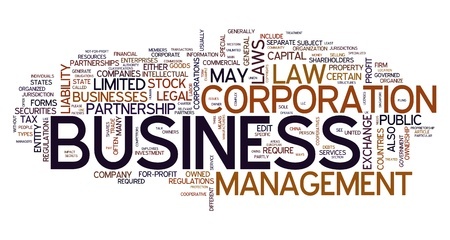Today I'm here to talk to you about the single member LLC mistakes that I see online businesses, such as bloggers, podcasters, YouTube creators, affiliate marketers, Amazon sellers, all those people make when setting up and running their LLCs. So let's get to it.
The single member LLC is one of the most commonly used business entities for setting up an online business, but it's also extremely easy to make mistakes in the way you set them up, maintain them, and operate them just in general. Today we're going to pull back the curtain and demystify some of the most common mistakes that I see clients make as online businesses with their single member LLC. Ready? Let's do this.
What is an LLC?
So whether you're a blogger or you're a podcaster, whether you sell online products through an e-commerce store, or you're an affiliate marketer, forming a single member LLC can be one of the smartest things you can do for your online business. Well, that's all well and great, Jim, but what the heck is a single member LLC? That's a great question, I'm glad you asked. Let's get into that. LLC stands for Limited Liability Company. I realize that somewhat of a mouthful. One of the main reasons that people start a single member LLC is because they want to protect themselves, they want to insulate themselves and their personal assets from the legal debts and responsibilities of the business. So basically you're setting up a separate company that is distinct and separate from you as a person. One of the other main benefits of an LLC that a lot of people don't know about though, is that it also protects your company assets from your personal debts.
I want to share with you is basically the whole idea of an LLC is. So you've got your home. You've got your bank accounts, your investments, your car. You've got all these things. Now, you've got your LLC out here. Right? Now what you're doing is you're putting a bubble around all this stuff. So if the LLC ever gets sued, then when somebody comes at you and is like, “You know what? I want to get your house.” They're not going to be able to do it because you've got this protective force field around everything.
Does that make sense? I hope. That's the general idea. And this right here, that's called the corporate veil. Got it? That's enough of a legal lesson for the day. Let's say you mess stuff up with your LLC right here. And let's say you don't form it correctly, or you make some of the mistakes, so they can get all this stuff. Home, bank accounts, investments, car, whatever else you've got. That's a problem. And that's thumbs down.
And I should mention also that if you are a single member LLC, which is what we're kind of talking about today, this is even more important, because a single member LLC is even more heavily scrutinized than a multi-member LLC, which has multiple parties involved.
So I'm sure the reason this is so important to you is because if you are an online entrepreneur and you're building a business online, like I said, blogger, podcaster, YouTube creator, Instagram person, any of those things, affiliate marketer, selling stuff on e-commerce, on Amazon, whatever, you probably want to make sure your business is legally protected. That's important to you I would imagine. Am I right? You want to save money on taxes, you want to protect your intellectual property. And all of these things, everything that we're talking about here, the intellectual property, all that stuff, it starts with setting up your LLC correctly from the get-go. You with me? Okay. But there's a couple issues that you need to be aware of.
Yes, single member LLCs are easy to set up. Okay? They're flexible. They provide your limited liability. They check all the boxes of what you need in a business. They're the perfect business entity. But that doesn't mean they're the end all be all. Just as easy as they are to set up, they're just as easy to F up, if you don't set them up properly, or if you fail to maintain them in a way that's going to be legally advantageous. And listen, I get it. As an online entrepreneur, you're more worried about getting subscribers, getting website views, getting people on your YouTube stuff, doing all of those things, getting sales, building sales funnels. You're more worried about doing that than you are about all the legal stuff that I deal with on a daily basis. And the other thing I think that you need to know is different states will have different requirements for piercing the corporate veil.
But in general, the mistakes that I'm about to tell you about here in today's video will be applicable to pretty much every business. And if you don't make these mistakes you're going to set yourself up, you're going to be in a better position that you're not going to make mistakes that will hurt your business, regardless of what stage you're in.
All right, let's get into the mistakes. And the other thing I'll say about this is that there is a lot at stake if you mess up your LLC. You might lose that good client that you've been trying to get for months and months because your LLC isn't set up properly, or maybe you don't have an LLC set up at all. You could lose some credibility when it comes to your clients if your LLC is not set up properly. They may wonder if you're a legitimate business enterprise that can actually help them or not. Or you could even miss out on or lose valuable intellectual property rights.
So I realize that was a really long kind of intro set up to what we're really talking about today. But I think it's important that you have that backdrop of understanding before we talk about the mistakes people make with their LLCs. Because if we go right into the mistakes without all that backdrop then you really miss the context of why this is so important and how this really works. Big picture, five major mistakes people make with their LLCs.
Single Member LLC Mistake #1 – Not Having a Different Bank Account for Business
So the first one is commingling funds. What does that mean? That means that you set up a bank account for yourself personally, and then you just start depositing all the money from the business into it. So if somebody pays you, instead of opening up a separate business bank account you put everything into your personal account. Or vice versa, you've got a business account and you just start using that to deposit your personal paychecks and different things like that. So that is a big mistake people make. When you do something like that it starts to show the courts, if there ever was to be a lawsuit, it shows them that there really is no distinction between you and the business. And so that is a huge mistake I see people make is they just kind of commingle funds. I've talked to people who've been in business for 20 years and have been doing this ever since they started. And it is a huge mistake. You need to set up a different bank account for your personal stuff and a different bank account for your business stuff.
Single Member LLC Mistake #2 – Not Keeping Corporate Records
All right. The second thing that I see people do is they don't have the proper corporate records set up. So you don't have your operating agreement in place. If they make a decision that's a big decision related to the business, they don't keep track of their meeting minutes. And that's another huge problem that I see people make. So there're different things that people do. They don't keep adequate corporate records. Now, the thing is, as a corporation, corporations have to keep corporate records. As LLCs, you're kind of encouraged to keep corporate records, but you don't really have to. But if you ever get sued and you end up going into court, it's really important that you have those corporate records in place and ready to show the court, “Listen, we are a legitimate business. And even though I'm a single member LLC, here's all the information and the documents to prove that we've been operating as a business.” That's going to go a long way.
Imagine if you went into court, you have nothing to show that you're a business, or you've got a notebook full of all the things and actions you've taken showing that you are a corporate enterprise or an LLC. That's going to lend a lot of weight in the eyes of the judge.
Single Member LLC Mistake #3 – Inadequate Capitalization
All right. The third one is kind of a double-edged sword, and it's inadequate capitalization. As a business, you have to keep enough money in your bank accounts to pay the debts of the business, to pay salaries, to pay those types of things. And so what you can't do is you can't deposit money into the bank account as you earn it and then immediately take it out and leave no money in the bank account of the business to pay the business's debts. So if you ever were to get sued and you take all the money out of the business, that's a problem. So it shows again that there really is no distinction between you and the business. But it's a double-edged sword because a lot of businesses, when they're just getting started, don't have a lot of money. The question becomes: is the inadequate capitalization, in other words, is the lack of funds in the bank account because you're taking the money out to insulate the business from its debts, or are you doing it because you just are getting started, your startup, and you just don't have a lot of money?
The reason why you are inadequately capitalized, if that is the case, is going to be scrutinized by the courts. And depending on which way it is, in other words, if you're inadequately capitalized because you're taking money out or if you're inadequately capitalized, it's a lot of words to say, because you are just a startup and don't have a lot of money ye, that's going to play a difference. So that's a factor, but just beware that there's two kind of scenarios there that you need to be aware of.
Single Member LLC Mistake #4 – Using Business Bank Account for Personal Transactions
All right. The next problem I see is people spending money like it's their personal bank account. They use the business bank account like their personal bank account. So if money's coming in the personal bank account and you're using it to go buy groceries, you're using it for your rent payment, I mean, that's really very similar to what we talked about the first mistake I see people make, which is the commingling. It's very similar to that. But it's different in a little bit, because really what you're doing here is you're using your corporate bank account or your business bank account as kind of like your slush fund to use for whatever you want. That is a problem. So if you ever were to get sued and a court sees that you're just kind of using the business bank account to kind of pay yourself whatever, or pay for whatever expenses you want, that is going to be a problem and you need to be careful about doing that.
If you want to pay yourself money out of the business, that's fine. Write yourself a check out of the business, deposit into your personal bank account, then pay the expenses. That's the way I always tell people to do it. That's the way you should be doing it.
Single Member LLC Mistake #5 – Not Getting Adequate Insurance
And the fifth mistake I see people making is not getting adequate insurance to protect themselves. Getting a general liability policy for your business is a very simple thing to do. It's generally speaking very inexpensive. Usually it's a couple hundred bucks a year. And it's going to give you up to around a million dollars of coverage should something happen with your business that you would get sued for. It's a good idea to have that, because if you were to get sued, the insurance is going to step in place first. There's issues with insurance, I've talked about that in other videos, but in general the insurance is going to step in. And provided it's a valid claim, the insurance is going to pay the claim first, and then you will be on the hook second. So you want to make sure that you have adequate insurance in place. It's a small expense. I realize you're probably never going to use it, but in the event that you do need to use it, it could save you a lot of money in it future.
Single Member LLC Mistake #6 – Concealing and Misrepresenting Ownership
And the sixth mistake I've got for you today, I know I said I was going to do five, but I decided to do six because I'm a giving type of person and that's kind of the way I work here, that's the way I roll, is, and I see this more often than you can imagine, is trying to conceal and misrepresent the ownership. Now it's one thing to create an LLC, a private LLC, because you're concerned about privacy reasons and concerns. It's an entirely different thing to try and conceal and misrepresent who owns the LLC. And by doing that, what people will do is they'll normally form multiple LLCs, and the entire purpose of forming multiple LLCs and trusts and different things like that is because they're trying to hide the identity of the owners of the LLC. And that is a problem because that will get you in trouble.
In most states they don't like to see fraud, and this could be considered fraud, because you're basically trying to hide who owns the LLC. I've seen people try and hide the assets and the debts. So they form one LLC that holds all the assets of the LLC, and they have another LLC that has all the debts of the LLC. That again is a problem. That's a big no-no. You don't want to be doing that. That is an issue. Just be aware of that. Most people will not have problems with that. But especially single member LLCs, you're not going to have problems with that, but it is something to be aware of. So as I said before, every state's going to have their own requirements about what is necessary to pierce the corporate veil, as I showed in my highly developed and amazing diagram that I put out earlier.
But in general, if you avoid making the mistakes, you can really make it very simple to avoid a piercing of the corporate veil in your situation. Don't commit fraud, and don't try and get cute with your LLCs by forming multiple LLCs just for purposes of misrepresentation or to conceal who owns the business. It's just not a good practice and it's not going to help you. And it could actually get you in big trouble later on.



